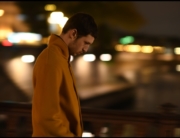The black-and-white cinematic poetry of Robert Bresson’s and Carl Dreyer’s religious films inspired Israeli writer/director Avishai Sivan to reset their solemn explorations of extreme Christian faith in the Haredi (ultra-Orthodox Jewish) community in the old city of Jerusalem.
In Tikkun, secular artist Sivan closely follows the storyline of Carl Dreyer’s Ordet (1955), where a Danish Christian cult is tested when their fervent prayers bring the purest family member back to life. While that family debated some diversity of philosophies, the Mea Shearim neighborhood is more insular so that the daily experience of the young scholar Haim-Aaron (Aharon Traitel) is restricted between the yeshiva, where he obsessively studies, and his parents’ religiously observant home. An early image of a cow lumbering up the street hints that nature sometimes gets loose, but the bovine is headed to the bloody abattoir of his father (Khalifa Natour), a kosher butcher.
At home, the self-abnegation of the abstemious son leads to his physical collapse. To his family’s great distress, the paramedics work on him for 40 minutes to no avail. His distraught father insists on continuing CPR beyond all signs of life, until Haim-Aaron takes a breath and is brought back to life. But is he the same man with the same soul?
His histrionically worried mother (Riki Blich) fears her husband went too far in challenging divine will, as her now restless son doesn’t seem the same: he no longer eats meat or studies. Meanwhile, his father is now continually haunted by vivid nightmares, whether he’s awake or asleep. (An alligator in the bathroom is just one animal that Sivan uses for mystical symbolism).
Haim-Aaron’s peregrinations into the modern Israel come close to how the movies usually portray the irresistible temptations of the flesh for the Orthodox. But with a dab of humor, he manages to seem more like a curious naïf, especially about sexuality and genitalia, than a rebel, thanks to Traitel’s grounded debut performance amid the surreal imagery. Traitel himself grew up in—and left—the Hasidic fold, and he advised Sivan on accuracy (including translating the dialogue into the appropriate Yiddish).
But the prime reason to see this artsy film is the beautiful black-and-white work of cinematographer Shai Goldman. With no musical score for support, he gets to go beyond his previous spookiness in the bright sun of The Kindergarten Teacher (2014) and the dark noir of Naomi (2010). The film is slow, dark, ponderous, and beautiful looking with weird, mystical imagery—a long close-up of female genitalia seems to overpower some viewers more than the intellectual debates about challenging divine will.
This is second film in what Sivan calls his “religion trilogy.” His first, The Wanderer, is not available in the United States, not even in festivals stateside, despite premiering at the 2010 Directors’ Fortnight section in Cannes. He describes that debut as an experimental look at another yeshiva scholar’s crisis of faith. Cinephiles will be curious as to what might be weirder, albeit the follow-up is a refreshing change from the many, many films and TV shows that parse and extend Christian prophesies.
Tikkun is being released in the U.S. the same weekend when the observant mark Tikkun Leil Shavuot, an all-night study session of the Bible and rabbinic religious texts during the holiday that celebrates the giving of the Torah through Moses. Sivan defines the title as the daily effort for self-improvement and, in a more kabalistic translation, as the soul redeeming itself in preparation for an afterlife. Not surprisingly, his film is open to multiple interpretations.







So, rather than explore some kind of spiritual awakening by someone who has had a near death experience (NDE), the director has to go to smut, since it sells. And degradation of religious folk wins awards.
So sad.
Like others, I was initially appalled, or should I say, repulsed, at the crude genitalia scene. Then I pondered on the symbolism involved: the exploration of sexuality is so taboo, even as he finally does so, it is on a dead body part, not an extant, interactive woman. It also speak volumes to the profound misogyny that pervades most ultra-orthodox faiths, despite their claims to the contrary. The movie deeply affected me; it will take considerable thought to fully digest it.